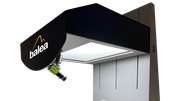Blog
A strategy to take a retail business across borders
Storefront CMO Stephanie Kidder explains that while doing business in a new country can come with a daunting list of questions, costs and unfamiliar regulations, it can be made easier with a short-term retail space strategy: the pop-up store.

July 19, 2019
By Stephanie Kidder, CMO, Storefront
Brands without borders are on the rise. Consumers around the world are connecting with companies via social media and their websites instantaneously and with ease. Cumulative data from Shopify anticipates a 276.9% increase in worldwide ecommerce sales over the most-recently tracked period. Despite the unprecedented ease of access to international brands, there is still a level of familiarity and trust that is difficult to achieve online. This is just one consideration among many, for brands looking to expand their physical presence internationally.
While doing business in a new country can come with a daunting list of questions, costs and unfamiliar regulations, it can be made easier with the ready availability of short-term retail space, or pop-ups. We took a look at brands who have recently done just that, and how they used a short term space to accomplish their goals.
Deepen connections in your existing global community
Fitness apparel and lifestyle brand, Gymshark, is based in the U.K. but works with influencers, athletes and coaches worldwide. The online community of highly engaged users is stretched over 131 countries, and the company is using pop-up stores to deepen that connection even further. Gymshark worked with Storefront to open their first ever LA pop-up store.
The store offered an exclusive collection designed with influencer Nikki Blackletter, who was at the store with other Gymshark athletes all weekend to take photos with fans. These athletes are a real inspiration to Gymshark customers, who follow their daily lives and accomplishments online. Giving fans an opportunity to meet them in person, adds a real authenticity and emotional connection.
A few months later, Gymshark hosted their #LiftAmsterdam event. In an era where everything is visible online and people are exposed solely to the highlights of an event rather than the nitty-gritty IRL shenanigans, it's more important than ever for us, as a brand, to stand for something. Today, and everyday, we stand for transparency, the brand said on their website. Nurturing and engaged community is key for brands with a large network like Gymshark. Finding spaces quickly and easily with Storefront has allowed these events to continue without losing momentum and buzz around their messaging and brand.
Try before you buy
A major goal for London based Brompton Bicycle was to focus on global retail expansion in 2018 into this year. Brompton already has 12 brick-and-mortar stores globally, and looked to year long pop-up spaces to continue this expansion.
"We have worked with Storefront for our store in Amsterdam and love how flexible and straight forward a pop-up lease is. The site selection and negotiations are aided by Storefront the entire way. We opted for a pop-up store over a long-term lease in order to minimize our risk as we enter the NYC market (this is the 12th Brompton Junction store globally). Our primary goals were opening to be established in time for NYC's bike season, beginning in April," Vice President of marketing and retail, Peter Yuskauskas told us.
With the goal of both sales and awareness, the team shopped several NYC neighborhoods to find the best fit. Brompton wanted to create a look and feel that matched their brand, and have good foot traffic without encroaching on their existing partner shops. Yuskauskas said working with Storefront allowed them to really get to know the neighborhoods and talk to existing store owners. He advises brands to get to know the space owner as well and share your story. This helps them visualize your success in their space and may help you negotiate a better deal.
Share a cause
For international apparel brand Toms, cause marketing has been the core of their business since the beginning. In partnership with Joshua Coombes, founder of the #DoSomethingForNothing campaign, Toms held a four-city pop-up art exhibition. The goal was to amplify the stories of people experiencing homelessness via multimedia art, and the team worked with Storefront to secure its Amsterdam and Paris pop-up spaces, each for a day-long event.
Toms worked with Storefront to meet its need for a gallery space that could host about 150 people, and hold artwork on the walls. The team chose to do the pop-up tour in four cities that were very representative of the issue of homelessness the team told us. The brand said most important was their goal, since the beginning, to bring these communities together, to have important conversations, and hopefully inspire new connections and collective action.
The pop-up concept enables brands to create awareness, and to interact and test new markets outside their home countries with limited risk and cost. We are seeing this now more than ever as brands move from domestic expansion to international audiences.
 ChatGPT
ChatGPT Grok
Grok Perplexity
Perplexity Claude
Claude




